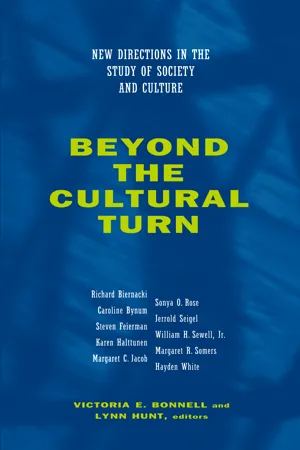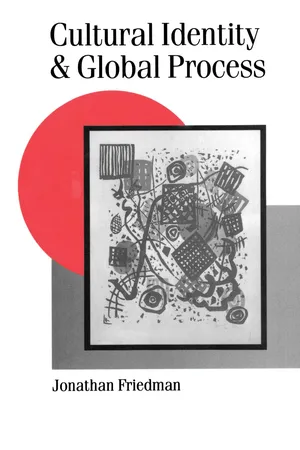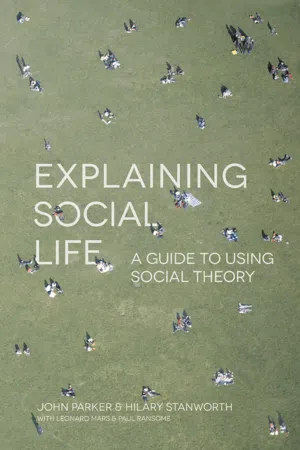Social Sciences
Concept of Culture
Culture refers to the shared beliefs, values, customs, and behaviors of a particular group of people. It encompasses language, traditions, art, and social norms that shape the way individuals within a society interact and perceive the world. Culture is dynamic and can evolve over time, influenced by historical, environmental, and social factors.
Written by Perlego with AI-assistance
Related key terms
1 of 5
10 Key excerpts on "Concept of Culture"
- eBook - PDF
- Edward Sapir, Judith T. Irvine(Authors)
- 2011(Publication Date)
- De Gruyter Mouton(Publisher)
The Concept of Culture in the Social Sciences 51 sciously apply criteria of value to our data, and make certain value judgements in the selection of the behavior patterns to be studied. [And so do the people we study. For this reason] all cultural concepts are relative, depending on the peculiar ideology and historical background of particular cultures. 4.2. [Culture is nonbiological.] The cultural is also nonbiological — [not only in the sense that] it is not hereditary, but also in the sense that it is dependent upon equivalences of phenomena which can be biologically or physically described but whose locus of equivalence is not to be found in biological explanation so far as that can at present go. [That is, although behavior has a physical dimension, cultural patterns] are not physically definable; they are only definable through [a principle of] substitutions. Culture [represents] an arbitrary theory of equivalences, where one set of physical facts can be translated into another (its symbolic equivalent), as spoken words can be translated into written ones. There is no limit to this fictitious world of symbolic equivalences, but rather, [ever] new combinations [matching] the infinite variety of experience. The locus of the pattern is not in biology or physics, so the culturalist is never interested in the biological or physical world [as such]. Even [our patterns of] adjustment to primary biological needs are plastered over with secondary cultural meanings. And we have learned to get away from those partly biological experiences which were responsible for our knowledge in the first place. [Arithmetic,] for example, [may have arisen from] counting the fingers on the hand, yet the concept of ten can be projected even though [a particular] individual has only seven fingers. - eBook - PDF
Beyond the Cultural Turn
New Directions in the Study of Society and Culture
- Victoria E. Bonnell, Lynn Hunt, Victoria E. Bonnell, Lynn Hunt(Authors)
- 2023(Publication Date)
- University of California Press(Publisher)
Here, I will be concerned primarily with culture in the first sense—culture as a category of social life. One must have a clear con- ception of culture at this abstract level in order to deal with the more concrete theoretical question of how cultural differences are pat- terned and bounded in space and time. Once I have sketched out my own ideas about what an adequate abstract theory of culture might look like, I will return to the question of culture as a bounded uni- verse of beliefs and practices—to the question of cultures in the Benedictine sense. CULTURE AS A CATEGORY OF SOCIAL LIFE Culture as a category of social life has itself been conceptualized in a number of different ways. Let me begin by specifying some of these different conceptualizations, moving from those I do not find espe- cially useful to those I find more adequate. Culture as learned behavior. Culture in this sense is the whole body of practices, beliefs, institutions, customs, habits, myths, and so on built up by humans and passed on from generation to generation. In this usage, culture is contrasted to nature: its possession is what dis- tinguishes us from other animals. When anthropologists were strug- The Concept(s) of Culture 41 gling to establish that differences between societies were not based on biological differences between their populations—that is, on race—a definition of culture as learned behavior made sense. But now that racial arguments have virtually disappeared from anthro- pological discourse, a Concept of Culture so broad as this seems im- possibly vague; it provides no particular angle or analytical purchase on the study of social life. A narrower and consequently more useful conceptualization of culture emerged in anthropology during the second quarter of the twentieth century and has been dominant in the social sciences gen- erally since World War II. - eBook - PDF
Psychology and Culture
Thinking, Feeling and Behaving in a Global Context
- Lisa Vaughn(Author)
- 2019(Publication Date)
- Routledge(Publisher)
Broadly, culture can be defined as integrated patterns of learned beliefs and behaviours that are shared among groups and include thoughts, communication styles, ways of interacting, views of roles and relationships, values, practices, and customs (Berry, Poortinga, Breugelmans, Chasiotis, & Sam, 2011) or more sim- ply, ‘a total way of life of a people’ (Geertz, 1973). Culture can be expanded to include many factors which encompass aspects of daily life and social influences/factors. This means we are all ‘culturally different’ given different family backgrounds, religions, occupa- tions, disability, gender, socioeconomic status, sexual orientation, etc. Beyond race and ethnicity, we all are part of and influenced by Introduction What Is Culture? I N T R O D U C T O R Y C O N C E P T S 3 multiple cultures. Each of us is a multicultural individual with many sets of cultures in different contexts that may or may not coincide. See Figure 1.1 for different emphases in the definitions of culture. Culture is complex and multifaceted, pervasive and embed- ded in many aspects of life and living. Berry and colleagues (Berry et al., 2011; see Figure 1.2) outline six general aspects in which culture can be discussed: 1. Descriptive emphasizes the different activities and behaviours of a culture. 2. Historical aspects refer to the heritage and traditions associ- ated with a particular cultural group. Social Difference Beliefs/Behaviors Race Ethnicity Gender Social class Sexuality Religion Disability Communication style Thoughts Ways of interacting Views of roles/relationships Values Practices Customs Figure 1.1 Different Emphases of ‘Culture’ Berry’s Aspects of Culture Descriptive Historical Normative Psychological Structural Genetic Figure 1.2 Berry’s Six Aspects of Culture I N T R O D U C T O R Y C O N C E P T S 4 3. Normative signifies the rules and norms of a culture. 4. Psychological refers to the behavioural aspects of culture like learning and problem solving. - eBook - PDF
Beyond Semiotics
Text, Culture and Technology
- Niall Lucy(Author)
- 2001(Publication Date)
- Continuum(Publisher)
1. The Concept of Culture Like all concepts, the Concept of Culture has many applications. Some sense of the many ways in which 'culture' can be used is given by the thesaurus, where its main synonyms are listed as breed stock, learning, civilization and good taste. The entry for 'culture' itself lists as synonyms the terms literature, the humanities, liberal education, scientific education, cultivation of the mind, acquisitions, accomplishments, proficiency, mastery. From this list, which is only partial, 'culture' may be said to mean something like the best of human thoughts and deeds, confined largely to the realm of artistic activity and tied clearly to some notion of self-development. Hence the Concept of Culture is being lent here a certain specificity, as opposed to what might be called the anthropological understanding of culture as a whole way of life. We will come back to that understanding later. But for now let's continue with this other definition of the concept which I want to call (and there are many ways of designating it) a humanistic understanding in so far as it emphasizes notions of aesthetic value and moral purpose. This is quite a common understanding of culture in its everyday use. Aesthetic products and practices are thought to make up the domain of culture, in other words, and an appreciation of this domain is justified for its morally purposive effects. The appreciation of culture makes for a better person. In the English-speaking West the educational site par excellence of this definition of culture was, until recently, and in many cases remains, the university English department. The whole point of reading English Literature was that it would make you a better person. Again, though, it should be stressed that this definition of the concept has to be set against the anthropological understanding of culture as a whole way of life. - eBook - PDF
- Jonathan Friedman(Author)
- 1994(Publication Date)
- SAGE Publications Ltd(Publisher)
The notion of culture as an abstractable packet of signs, symbols, tools and beliefs became increasingly systematized in the first decades of this century. A student of Boas, Alfred Kroeber, played an instrumental role in this development of a 'theory' of patterns of culture. And in the work of Kroeber's student Julian Steward, as well as in the parallel work of Leslie White, culture became a system in which ecological, economic, social structural and ideological domains participated in a dynamic totality of an evolutionary process. Here the concepts of culture and society became largely indistinguishable. And, among the neo-evol-utionists and cultural materialists who dominated American anthropology in the 1950s through the 1970s, this has continued to be the case. This notion of culture can be summed up in the idea that culture is that complex or system of relations by which Homo sapiens adapts to the world, replacing the former biological system of instincts. 1 There is a further development in the Concept of Culture in the United States, which has led to the contemporary popular usage of the term as an essentially symbolic, cognitive (that is, ideational or semantic) construct. This resulted largely from the cooperation between Kroeber, Clyde Kluckholn and the Harvard sociologist Talcott Parsons, who, in his attempt to combine Weber's verstehen with Durkheim's functionalism, divided social research into, among other things, the study of social structure and the study of culture or socially attributed meaning. This resulted in an anthropology at Harvard that specialized increasingly in the study of systems of meaning, symbolism, cognitive categories, etc. Clifford Geertz, a principal exponent of the more limited version of the culture concept, was a product of this intellectual milieu. For Geertz, culture is the publicly accessible text of a people, a symbolic program inscribed in the time and space of social life and their true essence. - eBook - PDF
- Bernardo Bernardi(Author)
- 2011(Publication Date)
- De Gruyter Mouton(Publisher)
The first man to introduce this clear scientific meaning of culture was Tylor in his famous book Primitive culture (1871), where we find the following definition: Culture, or civilization, ... is that complex whole which includes knowledge, belief, art, law, morals, custom, and any other capabilities and habits acquired by man as a member of so-ciety. The great merit of this definition lies in the fact that it points to a series of phenomena which are important and interdependent enough to become the objects of a separate science. As a first definition it may be called excellent because it indicates a direction for research without imposing too arbitrary limitations: the criterion acquired is sufficiently vague, and the list of phenomena does not claim to be exhaustive. It will be the task of the newly created science itself to define its boundaries more precisely and to make out which criteria must be stressed. As appears from the inquiry made by Kroeber and Kluckhohn — who collected some 160 definitions — only limited progress in this direction was made from 1871 to 1920. From that period they can quote only 6 new definitions. For the following decades, the number increases steadily: 22 from 1920 to 1930, 35 between 1930 and 1940, and 100 from 1940 to 1950. The increasing number of attempts at formulating a definition is without doubt symptomatic of the growing interest in the subject matter, but does not necessarily imply an increase in quality of the defini- An Analysis of the Concept of Culture 11 tions proposed. In fact, many are undoubtedly inferior to Tylor's; but, on the other hand, some reveal new points of view and new characteristics which constitute a real progress. The first thing I propose to do in this paper is to analyze the heterogeneous whole of these definitions and to try to find an order or classification of the numerous items mentioned in them. - eBook - PDF
Explaining Social Life
A Guide to Using Social Theory
- John Parker, Hilary Stanworth(Authors)
- 2017(Publication Date)
- Red Globe Press(Publisher)
P ART III The Concept of Culture 107 CHAPTER 5 What does culture explain? We have now reached a major turning point in this book as we begin to con-sider the concepts of ‘culture’, ‘action’ and ‘social structure’, which are the primary concerns of anthropologists and sociologists. We are moving to our own turf so to speak, and can explore the specific contributions of the social scientist to the explanation of human life. Though we do not want to draw too sharp a distinction, it is fair to say that anthropology (particularly in America) has concentrated attention on culture and sociology has focused on social structure, while both have had to reckon with action. This chapter begins to show you why all students of social phenomena, be they anthropologists, soci-ologists, social and cultural geographers, political scientists or historians, with their respective emphases, are nevertheless, dealing with a common realm defined by the interaction between culture, action and social structure. The easiest way to begin characterising this realm is to discuss the role of culture in social explanation (Figure 5.1). For the moment we can say that culture com-prises all that humans believe and do that isn’t an unmediated outcome of natural instinct. However before proceeding we can recap our progress. The story so far We have considered the place of two concepts in social explanation – ‘individuals’ and ‘nature’ (Figure 5.2). We have explored what is involved in referring to these as causal forces in shaping social regularities and pat-terns of behaviour. In each case we have argued that the concept refers to CULTURE constrains & enables conditions ACTION SOCIAL STRUCTURE Figure 5.1 What the social sciences contribute to social explanation: culture - eBook - PDF
- Bryan S. R. Green, Edward A. Johns(Authors)
- 2013(Publication Date)
- Pergamon(Publisher)
The clearest examples occur in studies of formal organizations where positions are officially defined for administrative purposes. The smallest type of social system consists of two actors and is called a dyad. Real life units such as the family, the club, the neighbourhood and so on may be analysed as social systems, though varying in size, type of interaction and activities engaged in. The largest and most comprehensive type of social system studied by sociologists is called a society. We have organized our discussion of concepts in terms of the three directions which the search for social regularities may take: (a) cultural elements; (b) the individual as social actor; (c) units of social interaction. 40 AN INTRODUCTION TO SOCIOLOGY CULTURAL ELEMENTS Culture was developed as a social scientific concept by anthro-pologists in the nineteenth century. Their primary concern was to distinguish social heredity, i.e. the passing down of culture from one generation to another, from biological heredity; to distinguish men from other animals. They used culture in an all-embracing way to include every aspect of social behaviour which could be thought of as distinctively human. According to Edward Tylor, the English anthropologist, culture is that complex whole which includes knowledge, belief, art, morals, law, custom and any other capabilities and habits acquired by man as a member of society. 1 A more recent definition by the American anthropologist, Kroeber, echoes this omnibus definition of culture as that which the human species has and other social species lack . .. speech, knowledge, beliefs, customs, arts and technologies, ideas and rules .. . what we learn from other men, from our elders and the past, plus what we may add to it. 2 The development of social science during the 1950's and 1960's has seen persistent efforts to narrow the concept for analytical purposes. One of the outstanding efforts was made by Kroeber and Talcott Parsons. - eBook - PDF
Beyond Hofstede
Culture Frameworks for Global Marketing and Management
- Cheryl Nakata(Author)
- 2009(Publication Date)
- Palgrave Macmillan(Publisher)
This diversity is compounded by the use of a variety of research methodologies, including observational studies, participant/observer studies, experimental and developmental studies, and survey research. As a result, there is no one overarching perspective that enables the integration or even comparison of the findings of these various literatures into a unified whole. Studies of the role of culture and consumer behavior have typically either explored the cultural embeddedness and meaning of consumption objects and behavior or examined the influence of culture on consumer attitudes and behavior patterns. In the latter case, culture has been con- ceived in terms of the value orientations that characterize a given society and govern its modes of interaction or behavior, the characteristic life- styles, and the behavior patterns of specific national, linguistic, or ethnic groupings. In some instances, this view of culture has been explicitly operationalized, whereas in others, it is implicit in the choice of the sampling unit. At least five major threads, each incorporating different conceptualizations of culture, can be identified. These differ essentially in terms of whether they focus on the content of culture or the unit of cultural analysis and in the extent to which cultural phenomena are the central focus of research or rather are viewed as influences on the phe- nomena studied. More critically, in each of these approaches, culture is necessarily studied within a context that helps shape it. Content of culture Culture as Artifact Each culture has its own vision of the world and set of culturally constituted meanings that provide understandings and rules for its 128 Impact of Context on Cross-Cultural Research members, and may often seem unintelligible to others. - eBook - PDF
Cultural Anthropology
An Applied Perspective
- Gary Ferraro, Susan Andreatta(Authors)
- 2017(Publication Date)
- Cengage Learning EMEA(Publisher)
There are, in other words, parts of culture that may not be mutually supportive, or may even be in conflict with one another. For example, the goals of a family are not always compatible with those of the workplace. Moreover, within the workplace FIGURE 2.10 In Chiapas, Mexican Indian women seen here drink bottles of Coca-Cola after a Catholic service. The Coke served on this day was not used in a religious service as it sometimes is, but was bought and served for guests from the U.S. who came to the village. Jack Kurtz/The Image Works Copyright 2018 Cengage Learning. All Rights Reserved. May not be copied, scanned, or duplicated, in whole or in part. WCN 02-300 The Concept of Culture ■ 39 itself, there are built-in conflicts between labor (inter-ested in maximizing wages) and management (inter-ested in maximizing profits). To be certain, cultures can be viewed as systems, but they also have certain parts that grind against one another. Thus, cultures are characterized by both harmony and conflict. The concept of integrated cultures is directly relat-ed to the concept of cultural relativism (discussed in Chapter 1), which involves viewing any item from within its proper cultural context rather than from the perspective of the observer’s culture. The fact that all cultures are composed of interrelated parts prompts us to explore how a feature from a new and different culture fits into its original cultural context. Cultures Change Thus far we have presented culture as a combination of things, ideas, and behavior patterns transmitted from generation to generation through the process of learning. This view of culture, focusing as it does on continuity among the generations, tends to empha-size its static rather than dynamic aspects. And yet a fundamental principle underlying all cultures is that there is nothing as constant as change.
Index pages curate the most relevant extracts from our library of academic textbooks. They’ve been created using an in-house natural language model (NLM), each adding context and meaning to key research topics.









